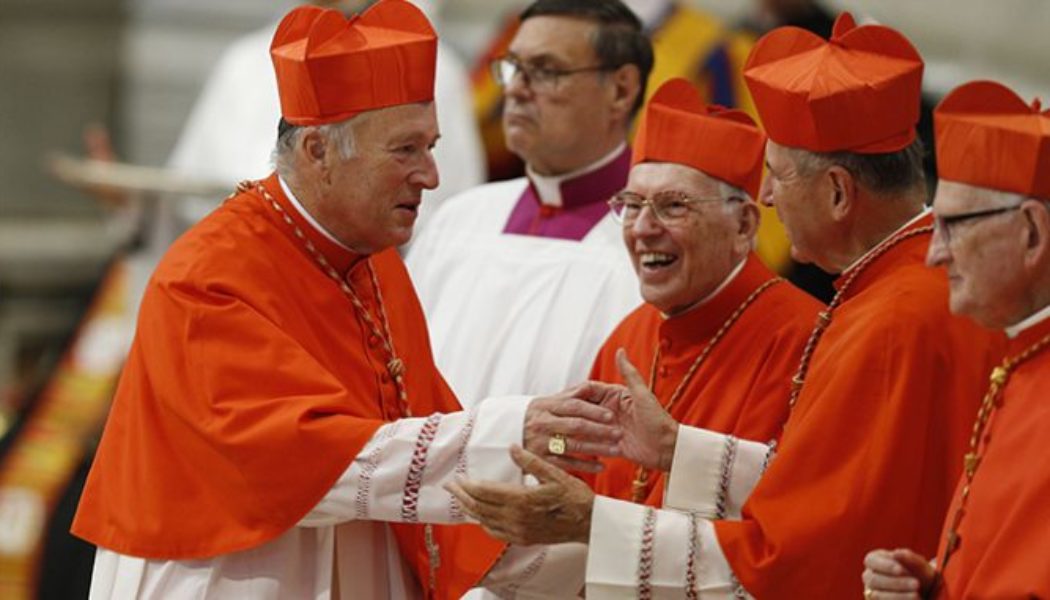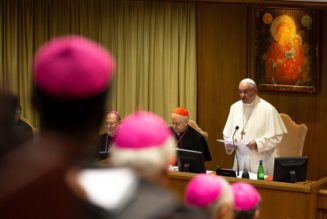
Cardinal Robert McElroy, in his recent remarks to the Los Angeles Religious Education Congress, stated the following:
It is essential to safeguard the deposit of faith. But how do the doctrinal tradition and history of the church restrict the church’s ability to refine its teaching when confronted with a world where life itself is evolving in critical ways, and it is becoming clear that on some issues the understanding of human nature and moral reality upon which previous declarations of doctrine were made were in fact limited or defective?
What does Cardinal McElroy mean by “life itself is evolving in critical ways”, as he does not define what he means by “life” here? We can surmise, perhaps, that he means the cultural context in which our lives are now embedded—and that this context has changed in radical ways. If that is all he means, then I am in full agreement. However, also left undefined is whether this “evolution” is, on the whole, a positive or a negative thing when analyzed from within a Catholic theological vision of life. And I have to think that the good Cardinal views this evolution in a largely positive light since he is lamenting the fact that current construals of Catholic doctrine need to be refined in the light of this new reality. And by “refined” it is clear that he means “repudiated and then reconstructed in line with modernity”.
Refining doctrine?
Before I am criticized for reading too much into his words, Cardinal McElroy himself goes on to say that “it is now becoming clear that on some issues the understanding of human nature and moral reality upon which previous declarations of doctrine were made were in fact limited or defective…” Certain doctrines of the Church need to change in order to keep up with cultural evolution, and the doctrinal tradition “restricts” the efforts of those who now see “clearly” that we need to “refine” these teachings. Indeed, the older doctrines to which he is referring—and he clearly means in the whole context of his speech the sexual doctrines—not only restrict our ability to bless the modern shift in sexual morality, but that they are also in fact “defective” and rooted in a now discredited “understanding of human nature”.
He makes these comments in the context of a discussion of the meaning of synodality, one aspect of which is the all-important category of “inclusion”. He claims that LGBGTQ Catholics have been excluded for too long from the Church and that this needs to change in our new and improved synodal Church which appears, for all intents and purposes, to be nothing more than NPR at prayer. He repeats the line from Pope Francis that the Church must be inclusive of everyone (“todos!”) but without the important qualifier that those who are now so included—and here he means homosexuals—should actually believe that their sexual activity is sinful and that they are in need of repentance.
But this is precisely what he wants “refined”. We must be clear-headed here in our analysis. The Cardinal is not saying that the Church should just drop all talk of sin and repentance and become a simple gathering of those seeking some vague “spirituality”. I assume that he would consider such sins as racism, economic exploitation, and single-use plastic straws as real sins in need of repentance. What he means, and this too is “clear”, is that homosexual acts are not inherently sinful (although some might be, just as with heterosexuals) and that we can now confidently assert this to be so, on the grounds that we now have a better understanding of human nature.
Cardinal McElroy is not alone in making this assertion. Cardinal Jean-Claude Hollerich, SJ, of Luxembourg has made similar claims concerning the outdated nature of the Church’s teaching on homosexuality, and in response to the question “are homosexual sex acts sinful” responded:
I believe that this is false. … I believe that the sociological-scientific foundation of this teaching is no longer correct. What one formerly condemned was sodomy. One thought at that time that in the sperm of the man, the whole child was kept. And one has simply transferred this to homosexual men.
But there is no homosexuality at all in the New Testament. There is only discussion of homosexual acts, which were to some extent pagan cultic acts. That was naturally forbidden. I believe it is time for us to make a revision in the foundation [Grundrevision: “ground revision,” or “foundation revision”] of the teaching.
Cardinal Hollerich later “retracted” this statement, but the retraction was clearly under pressure from the Vatican; he clearly meant what he said. And Pope Francis still made him the Relator General of the Synod on synodality, despite his heterodox views on human sexuality.
Homosexuality is not homosexuality?
The deeper point here is that the claim is being made by Cardinals McElroy and Hollerich, among many others, that what the Bible condemns is not homosexuality as we now understand it. Rather, what are condemned are the various deformations of human sexuality in pagan prostitution cults, pedophilia, the exploitation of slaves, and in sex acts that are nothing more than a form of aggressive male dominance over other males. Indeed, on Fr. James Martin’s webpage and social media accounts are articles that seek to reinterpret the “clobber verses” from Scripture (as he calls them) on homosexuality along these lines and to redeploy them as biblical condemnations of idolatry and exploitation rather than of homosexual acts as such. The claim is then made that homosexual acts as such were never properly understood by the Scriptural authors or later Church interpreters since they did not understand, or have knowledge of, what we moderns now “know”: homosexuality is a deep-seated orientation and those in same-sex relationships really can love each other.
But is this claim about the Scriptures true? I think not. For example, the claim that the ancients did not understand there are people with an inherent predilection for same-sex relations is highly questionable, more of an assertion based on rather flimsy linguistic contortions than a genuine scholarly accounting of the actual historical reality. It is true that ancient cultures did not speak of “orientations” or of “sexual identities” as we do, and preferred instead to focus on the actual act and the role of the participants involved. But to claim that the Scriptural authors and later Church Fathers were of the same mind is dubious since Christianity developed its own independent concept of the morality of sexual acts with an eye toward the normativity of the male-female nuptial embrace in marriage. And they grounded their revolutionary elevation of marriage beyond the pagan understanding of the same in a profound meditation on the data of biblical revelation.
And do we really want to say that the Scriptures are simply parroting the views of pagan antiquity? Because if the new proposals being put forward are true, then it means that the Scriptures do not really give us a specifically Judeo-Christian advance beyond these pagan concepts. But this is demonstrably false and implies that the entire nuptial theology of Scriptural revelation is nothing more than a kind of gloss over what is, in its essence, a pagan understanding of things. Furthermore, to dismiss in such a summary fashion the profound moral analysis of Thomas Aquinas, and the entire natural law moral theory that flows from the Fathers through Aquinas and beyond, as “defective” in its root understanding of human nature, is shocking in its sweeping superficiality.
Furthermore, the claim made by the revisionists involves not only a simple tweaking of our understanding of Scripture on this single issue but also carries within itself a not so latent claim of the defectibility of the Church on the entirety of her sexual and moral teachings. And should their revisionism be accepted as valid, the downstream consequences for Catholic moral theology, not to mention her traditional ecclesiology, are enormous. But this seems not to bother Cardinal McElroy and those who think like him.
What is at stake here is something of constitutive importance. It is telling that St. Paul (1 Cor. 5-6) develops the concept of sexual immorality as a sin against the body insofar as the sex act has a unitive function that, in a real way, binds one to the person with whom one is engaging. Therefore, sexual immorality violates Paul’s anthropological understanding of sex as something divinely oriented to the becoming “one flesh” of husband and wife. He thus also views sexual sin as a form of sacrilegious idolatry as it is a sin against the Holy Spirit.
Therefore, the alleged “new reality” in our time is not really about a more advanced concept of human nature drawn from the modern sciences as it is a philosophical, and ultimately theological, repudiation of this foundational, nuptial understanding of the sex act. As such, it represents a recrudescence, ironically, of the ancient pagan concept of the sex act as a kind of free-floating and rather ephemeral thing without deep anthropological, let alone theological, significance. It represents a movement back into a form of idolatry that the Scriptures explicitly repudiate.
In other words, the entire LGBTQ movement is a counter religion, which accounts for why it is held with a deep religious fervor and why it is always accompanied by a deep loathing for the traditional Christian construal of the sacramental anthropology of the sex act. The rainbow flag is, therefore, much more than a mere symbol of sexual diversity but is also the central icon of a new religion.
Furthermore, the claim that modernity gives us a single view of human nature to which we must now accommodate Church teaching is risible. The question “what is a human being?” is anything but resolved by the modern sciences, for in their reductive formulations they give us a view of the human that is more bestial than angelic. There are also scores of different theories of human psychology within the modern psychotherapeutic disciplines, most of which are mutually exclusive and many of which are motivated by political ideology as much as by science. Against this cacophony of discordant voices I happily place in contrast the Christian humanism of an Augustine, an Aquinas, a Francis de Sales, or a St. Pope John Paul II. Let these be our guide and not the questionable and ever-changing theories of secular, and largely atheistic, modern theorists.
The growing push to change Church teaching
And, so, it is important that we understand that the words of Cardinal McElroy in his speech were not the isolated, idiosyncratic ramblings of a single wayward and confused Cardinal who can be safely ignored. His words are expressive of a powerful movement within the Church by many in the hierarchy and the theological academy to change the Church’s teaching on homosexuality. The fact that he uttered such words at one of the largest gatherings of religious educators in the United States, without any evident fear of ecclesial discipline from above, says all you need to know about the increasing sense of empowerment that this movement feels at the moment.
There are some who will claim that the argument I am raising here constitute a form or ecclesial disobedience. Who am I, they say, to criticize in such strong ways a prince of the Church? Well, who do I have to be? A fellow Cardinal? But how clericalistic is such a view and how disempowering of the laity? “Religious submission of mind and will” is owed to the legitimate teachings of the Church and her official magisterial teachings, which have been formally and authoritatively taught. But this obedience does not extend to every utterance by every prelate, especially when those utterances explicitly call for the repudiation of those very same authoritative teachings!
And make no mistake, Cardinal McElroy is not calling for a deepening of our doctrines or their organic development. He is calling for their repudiation and reversal.
It is therefore out of obedience to the Church’s long established teachings that I raise this critique. Would that Cardinal McElroy and prelates who think like him felt the same compunction. Apparently they do not. Furthermore, in the same speech to the LA REC, Cardinal McElroy extolled the virtues of a synodal Church as a Church which is now a listening Church that allows “all voices” to be heard. It is a Church, he said, of co-responsibility between the hierarchy and the laity. And Pope Francis has often spoken of a Church of “parrhesia” which is an invitation to an open and free discussion of all viewpoints without fear of reprisal.
If that is so, then here is my voice added to the synodal listening. I doubt it will have much effect. Because, if we have learned anything over the past few years, it is that the “listening” involved in the synodal way seems strangely deaf to those voices that have not gotten the memo that we are a “Church on the move”.
Related at CWR:
• “On Cardinal McElroy’s misguided ‘clarifications’ on sin, sex, and conscience” (March 7, 2023) by Larry Chapp
• “Cardinal McElroy’s Grand Deception” (January 30, 2023) by Larry Chapp
If you value the news and views Catholic World Report provides, please consider donating to support our efforts. Your contribution will help us continue to make CWR available to all readers worldwide for free, without a subscription. Thank you for your generosity!
Click here for more information on donating to CWR. Click here to sign up for our newsletter.







